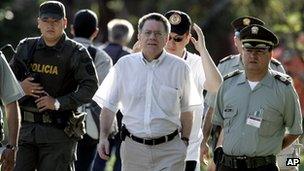Colombia orders ex-peace commissioner Restrepo's arrest
- Published

Luis Carlos Restrepo (c) has denied any involvement in the bogus demobilisations
An arrest warrant has been issued for a former Colombian peace commissioner on suspicion of faking the demobilisation of rebels.
Luis Carlos Restrepo allegedly staged the demobilisation by persuading criminals and unemployed people to pose as Farc rebels and hand themselves in to the authorities.
The warrant was issued after Mr Restrepo failed to attend eight court appointments.
Officials said he had left the country.
Mr Restrepo is the third close ally of the former President Alvaro Uribe to leave the country rather than face criminal charges.
He served as peace commissioner from 2002 to 2009.
Bogus demobilisation
Mr Restrepo had been ordered to appear before a court to explain his alleged role in the demobilisation of a group of left-wing Farc rebels.
The group handed themselves in to the authorities in 2006, but last year a number of those who had demobilised said they had never belonged to the rebel group.
They testified that they had been recruited in poor neighbourhoods of the capital, Bogota, and been paid to pretend to be rebels in order to inflate the number of Farc members who had demobilised.
The demobilisation of the group had been hailed as a success by the government of Mr Uribe, and questions about its veracity have enraged the former president.
'Political persecution'
Mr Uribe said the allegations against Mr Restrepo were part of a persecution by the judiciary against his cabinet.
Two other former officials from Mr Uribe's government have also left the country after charges were brought against them.
The former head of the secret police, the DAS, Maria del Pilar Hurtado, has been granted political asylum in Panama after she was accused of illegal phonetapping.
Former Interior Minister Sabas Pretelt de la Vega left his post as Ambassador to Rome and settled in Costa Rica after he was accused of bribery.
Mr Restrepo's current whereabouts are unknown, but officials confirmed he had left the country.
If convicted, he could face a sentence of at least six years in prison.
All three former officials have denied any wrongdoing.
- Published31 July 2011
- Published22 February 2011
- Published20 November 2010